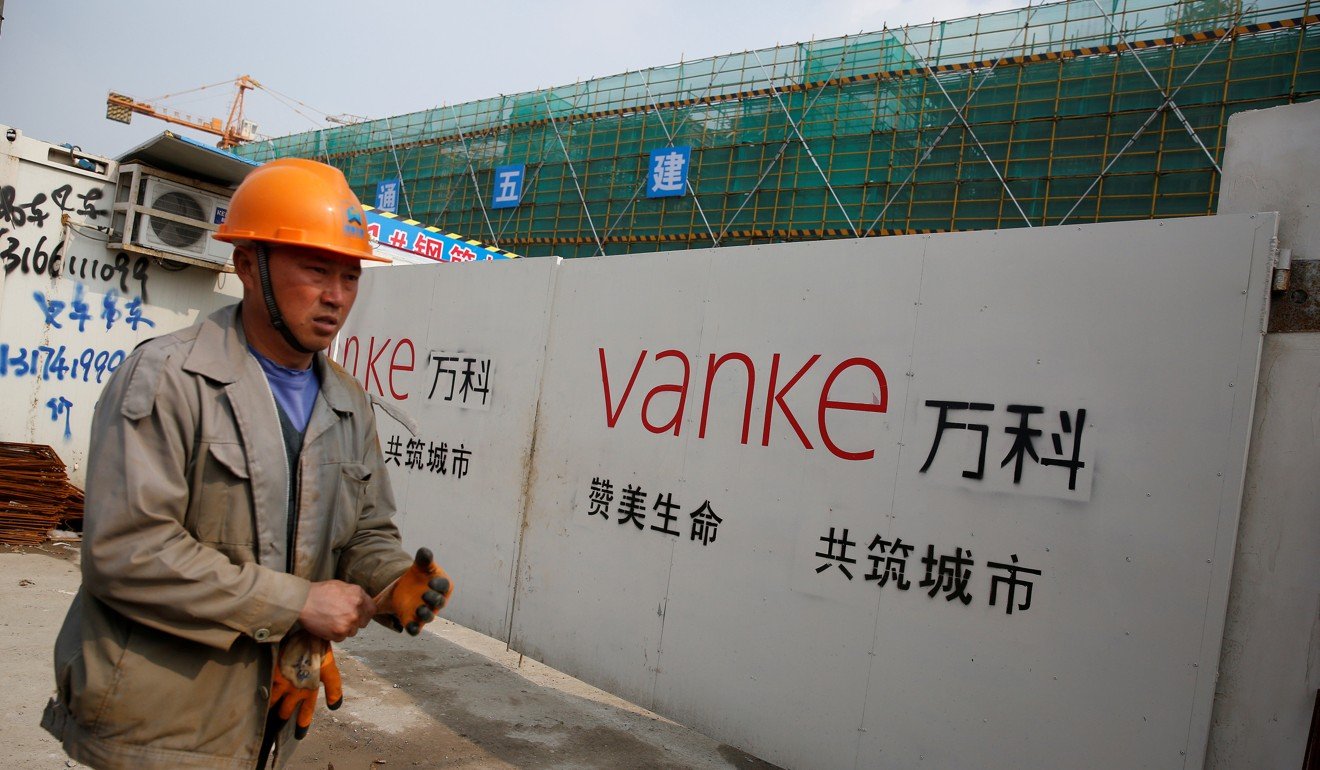
Top Chinese developers lower growth expectations for 2018
Industry does not expect 2017 boom in property to repeat itself this year
Top Chinese developers that released their annual results on Monday have set modest sales targets for this year amid a less sanguine outlook under financial restrictions introduced by Beijing, and the pursuit of better margins to woo capital markets.
China Evergrande Group and China Overseas Land and Investment have set relatively modest contracted sales targets for 2018 compared with their robust performance last year. China Evergrande has set a target of 550 billion yuan (US$87.57 billion), compared with the 501 billion yuan it made last year. China Overseas is targeting HK$290 billion (US$36.95 billion), on the back of HK$232.07 billion last year.
Country Garden, China’s largest developer by sales value, earlier revealed no specific sales target for this year, and only said it would try its best.
“If we seek 800 billion yuan in sales this year, it is also possible [to hit]. But it is unnecessary, because we have said we want to focus on profitability,” Hui Ka-yan, chairman of Evergrande, said after the company’s results were released.
Gaining from a property boom in China last year, particularly in tier-three and tier-four cities, 10 of the country’s biggest developers by market capitalisation have reported an average increase of 56 per cent in contracted sales, but the industry consensus is that it was less likely to maintain this momentum in 2018, because of strict buying restrictions and credit tightening. Most listed developers have flagged this risk in their annual results.
The current financing condition is relatively tight and cash collection not easy. So banks prefer big companies that operate a steady business over fast-expanding companies
“The macro environment is definitely a factor that will make it difficult to keep the same pace,” said Alan Jin, a property analyst with Mizuho Securities. “For top developers it is easier to maintain the same sales volume. But it is a big question mark if they can keep the presales margins this year, especially entering into the second half.”
Some analysts said the less ambitious goals were related to shifts in individual companies’ strategies.
“Evergrande’s goal is more related to a shift in its own strategy. While for state-owned China Overseas, it has kept a pace of 20 per cent to 30 per cent growth in sales over the past years, except when it had large merger and acquisition deals,” said Toni Ho, a property analyst with RHB OSK Securities.
When asked if the target for 2018 was too conservative, Yan Jianguo, chairman of China Overseas, said the target was set because of two reasons: tightening credit and the company’s own sales plan. Many of its projects will be sold in the second half of 2018, the fourth quarter in particular, which provides a rather short selling period.
Evergrande, for instance, set a goal in early 2017 to shift its focus to profitability and deleveraging over scale. Its contracted sales in 2017 grew by 34.2 per cent to 501 billion yuan, much slower than rival Country Garden’s 78 per cent expansion.
The Guangzhou-based developer’s gross margin in 2017 jumped by 8 percentage points to 36.1 per cent, while its net margin increased by 3.6 percentage points to 11.9 per cent, according to the result.
China Overseas’ margin also rose significantly – its gross margin rose from 27.8 per cent to 32.9 per cent, while its net margin advanced to 24.6 per cent. Both companies attributed the better margins to lower land and funding costs and higher home prices.

“The margin of presale in 2018 will not be as good as in the past two years, mainly due to an increase in land cost. The increase in selling prices cannot catch up with the jump in land costs,” said Ho.
Evergrande’s net gearing ratio slumped from 432 per cent by end 2016 to 184 per cent by end 2017, thanks to a swathe of redemption of perpetual bonds and cost control.
“The current financing condition is relatively tight and cash collection not easy. So banks prefer big companies that operate a steady business over fast-expanding companies,” said Xia Haijun, chief executive of Evergrande, adding that the company had set a target to reach a “medium to low” debt ratio level compared with its peers by 2020, even though its annual sales will reach 800 billion yuan by that year.
China Overseas is targeting 400 billion yuan in annual sales by 2020.
But even if the momentum in sales and profitability weakens this year, analysts said this will not affect companies’ 2018 results, as these results will be supported by the solid contracted sales of 2017. This year’s contracted sales should affect results of 2019 onwards.
China Vanke reported a 30.34 per cent increase in its core profit, which excluded revaluation gains on investment properties, fetching the company 27.28 billion yuan in 2017, up from 20.93 billion yuan a year earlier, according to a filing by the company to the Shenzhen Stock Exchange.
The reported net profit attributable to the owners of the company for 2017 was 28.05 billion yuan, up 33.44 per cent, on the back of a 45.3 per cent increase in contracted sales, which achieved 529.9 billion yuan.


